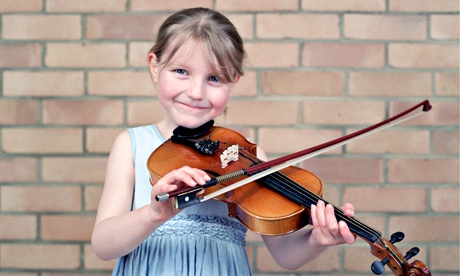
Playing Mozart and Beethoven to young children improves their listening skills, concentration and self-discipline, according to a study this week by the Institute of Education. The study was an evaluation of a programme for primary schools in the London boroughs of Hackney and Tower Hamlets. Some teachers credited the music with improving English skills.
If these are the effects of listening to music, what happens if you encourage your child to play an instrument? According to Glenn Schellenberg, professor of psychology at the University of Toronto, who studied the link between music lessons and higher achievement at school, it won't make much difference. His study, presented at the American Association for the Advancement of Science in Boston, suggests the link can be explained by the fact that children who have lessons come from richer families: it is their upbringing rather than the lessons that improves their memory, learning and reasoning. So are the benefits of music overstated?
The solution
The evidence for the benefits of music on developing brains is unclear. In a previous paper in Psychological Science, Schellenberg found that in a sample of 144 children randomly put into groups of keyboard, voice, drama lessons or no lessons, it was the children in the music groups who had greater (although small) increases in their IQ. The study pointed out that previous research shows musical aptitude is associated with better literacy and general intelligence, and that music lessons improve verbal memory and spatial ability. However, as Schellenberg said at the time, you couldn't say music lessons made kids smarter, as other influencing factors were hard to rule out.
The premise for the Mozart effect, now marketed so thoroughly for babies, is spurious, say many researchers. It all started in 1993 with an article in Nature by Francis Rauscher and colleagues showing that college students who listened to a Mozart sonata for 10 minutes showed improvements in spatial tasks – though this improvement lasted only for 10 to 15 minutes. Rauscher's further research found that 10 preschool children scored higher on spatial reasoning tests after having keyboard and singing lessons.
But a study in Nature in 1999 by Christopher Chabris, a psychologist, adding up the results of 16 studies on the Mozart effect, found only a one and a half point increase in IQ and any improvements in spatial ability limited solely to a paper-folding task. Another meta-analysis the following year had similar findings.
Other researchers say there is no evidence that playing Mozart (or Beethoven or Bach) to babies before or after birth increases IQ. So don't feel bad if you have ignored your child's classical music education. Instead, be persuaded by the Institute of Education's research that shows that children enjoy classical music and it encourages them to concentrate and listen.

